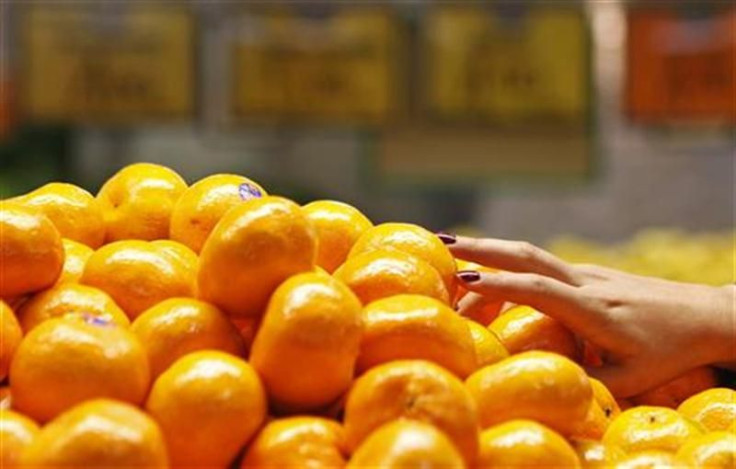U.S. Orange Futures Soar to Record High

(REUTERS) -- U.S. orange juice futures surged almost 11 percent to an all-time high on Tuesday, as reports that discovery of small doses of an unapproved fungicide in Brazil could crimp juice imports from that country added fuel to a rally sparked by a brief freeze last week in Florida.
The benchmark March frozen concentrated orange juice contract on the ICE Futures U.S. exchange, one of the smallest futures markets featured in the 1980s movie Trading Places, jumped the 20-cents daily limit to $2.0775 at 9:46 a.m. EST, taking two-day gains to nearly 17 percent.
The front-month January FCOJ contract, which expires Tuesday, was at a record high of $2.12, according to Thomson Reuters data. This rally exceeds the one that caused prices to rise four-fold in 2005 and 2006 after a series of hurricanes slammed into Florida and battered the crop, spreading diseases such as citrus greening, which is fatal for citrus trees.
The latest surge appeared related to news reports that the Food and Drug Administration had told juice makers that it would step up testing for the fungicide carbendazim, which is used in Brazil but is not authorized for use in the United States. The reports said the FDA had been contacted by an unidentified company that had discovered low levels in its own juice.
Brazil used it last year supposedly, and it wound up in some of the orange juice of at least one (U.S.) company processing the oranges, said James Cordier, president of Tampa, Florida-based Liberty Trading Group.
We lost oranges on the freeze last week but this certainly trumps that, he said. If they ban Brazilian orange juice OJ has...another 20 to 30 cents on the upside at least.
Brazil is the world's largest orange juice exporter, accounting for more than half of the sea-borne orange juice trade.
Analysts said the freeze that hit Florida last week had done only minimal damage to the crop. Meteorologists said on Tuesday that there was no further sign of harsh weather on the horizon in the No. 1 growing state. Prices rose nearly 8 percent last week on the freeze, but appeared to have cooled by week's end.
Country Hedging Inc analyst Sterling Smith said there was some nervousness about the freeze ahead of the U.S. Agricultural Department's monthly supply/demand report on Thursday when the next Florida 2011/12 citrus crop estimate update is released. But others saw little cause for alarm.
We experienced a little bit of damage. It was by no means catastrophic. We had some cold pockets across the state that had some burned leaves, maybe some twig damage, some reports of slush ice, said Andrew Meadows, a spokesman for Florida Citrus Mutual, the state's largest growers association.
But beyond the fundamentals, some traders attributed the price spike to a possible market squeeze, with short-sellers scrambling to cover their positions ahead of a possible shortfall in supplies. Trade was almost completely concentrated in the March and May contracts.
The orange juice market is particularly susceptible to dramatic volatility due to its tiny size compared with oil and other major commodities. Trading volume for March was just 1,270, an average day equivalent to about $19.05 million in nominal value.
You're seeing the rest being dragged along because of all the buying being done in March and May, a trader said.
© Copyright Thomson Reuters 2024. All rights reserved.












